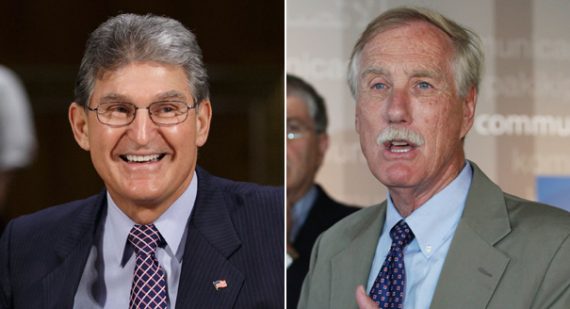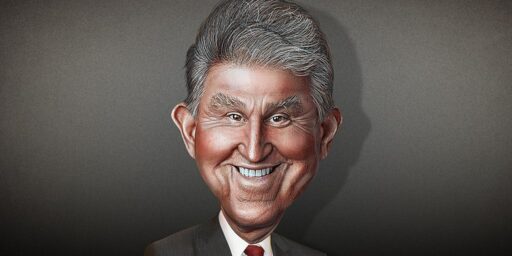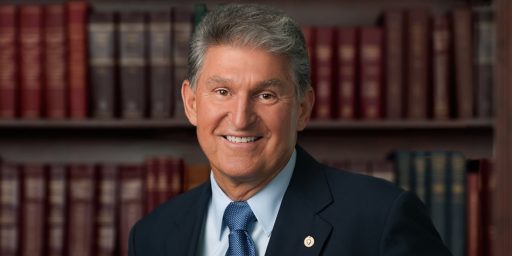Not Surprisingly, Angus King And Joe Manchin Are Staying Where They Are
Despite speculation, both Angus King and Joe Manchin will stay with the Democratic caucus. And that makes sense for both of them.
In the immediate aftermath of the Republican takeover of the Senate, including the probability that the ultimate outcome in both Alaska, where votes are still being counted, and Louisiana, where Senator Landrieu and Congressman Bill Cassidy will meet in a December 6th runoff, will put two more Democratic Senate seats in the Republican column, speculation immediately turned to whether the GOP might add to its majority thanks to defections from the Democratic Caucus The most likely, indeed the only, focus of that speculation focused on Maine Independent Angus King and West Virginia Democrat Joe Manchin. In King’s case, the speculation can be laid squarely at the Senator’s feet thanks to comments he made over the summer that suggested the possibility of switching his caucus vote if the GOP won control. While King’s general philosophy can fairly be called more similar to the Democrats than the Republican, he has been enough of a centrist during his time in the Senate that at least caucusing with the majority party would arguably make sense in his case since it would preserve his political power and ability to influence the agenda. In Manchin’s case, the speculation was more less specific and based more on the fact that the former West Virginia Governor is, clearly, the most conservative member of his party’s caucus. Additionally, West Virginia is clearly becoming a redder state with each election, so it would seem that a jump by the former Governor would likely not harm him much at home. Much like many of the southern Democrats in Congress who switched sides beginning in the late 80s, Manchin would arguably simply be following the trend of Democrats in his home state.
In the end, though, both Senators said today that they will be staying where they are. Senator Manchin was the first to send out word that a party switch was not in the cards, even though he also was pretty blunt in describing the message his party ought to take from Tuesday’s results:
Sen. Joe Manchin III (D-W. Va.) did not mince words on Wednesday when asked to describe the historic losses by congressional Democrats.
“This is a real ass-whuppin,” he said.
Manchin is a moderate first-term senator who has been openly flirting with going home to run again for West Virginia governor in 2016 instead of running for reelection. In a brief interview with The Washington Post, he unloaded on his party’s leader, saying he’s deeply frustrated with President Obama and Majority Leader Harry M. Reid (D-Nev.) for his stewardship of the Senate in recent years. He openly suggested he might not support Reid to serve as Democratic leader again next year.
“Harry, let us vote, let’s do something. It’s easier for me to go home and explain what I voted for and against than to explain why I don’t vote at all,” Manchin said.
Using a sports metaphor, Manchin said Senate Democrats have been acting in recent years like the West Virginia University Mountaineers football team did last Saturday: “We had the lead the whole entire game up until the middle of the 4th quarter and they decided to sit on the ball. And guess what? We got beat 31 to 30.”
“This is a rough and tumble sport and you know what? Every member of Congress – 535 – has earned the right to make a complete fool of themselves if they want to,” he added. “We just have to make sure that the American public can see who wants to get something done, who wants to be an obstructionist and who wants to be a fool.”
When asked whether Reid wants to do something, or is an obstructionist, or a fool, Manchin said: “I have no idea.”
(…)
But Manchin was complimentary of how the GOP performed in Tuesday’s elections.
“I think the Republicans played it masterfully,” he said. “You didn’t see them playing to the extremes in their primaries. Cory Gardner is a perfect example. He was a very conservative member of Congress. He runs for the Senate and he couldn’t get to the middle quick enough. So they understand what this country wants.”
(…)
Manchi once again ruled out leaving the Democratic Party — as many pundits and operatives have suggested in recent weeks that he should do.
“No,” he said flatly when asked if he would switch parties. “I’m a moderate Democrat, proud West Virginian. If you don’t have moderates on both sides and if you don’t have moderates on both sides, yonu don’t get anything done.”
Later in the day, Senator King, who had openly backed his Republican colleague Susan Collins for re-election over the Democratic nominee, announced that he too was sticking by his November 2012 decision to caucus with the Democrats:
Maine Sen. Angus King announced Wednesday that he will continue to caucus with the Democrats in Washington despite Republicans’ regaining control of the U.S. Senate.
King, an independent, acknowledged that caucusing with the majority party has perks. But King argued Maine is better served by him caucusing with the Democrats, especially with Maine Republican Sen. Susan Collins seated on the other side of the aisle and a Democrat in the White House.
King said that he hoped that both he and Collins – two centrists in a deeply partisan Washington – could work to “pull” their colleagues toward the political center. He votes more consistently with the Democrats but has bucked the party on some issues.
“I think it is in Maine’s interest to have a senator in each camp,” King said in a news conference outside his Brunswick home. “The reality of the current Senate, whether it is controlled by Democrats or Republicans, is that nothing can or will happen without bipartisan support.
He added: “Sometimes I will agree with the caucus position and sometimes I won’t, just has been the case for the last two years.
As Aaron Blake notes, this makes sense for both men and still leaves open the idea that they, along with some other Senators, could play a key role in bridging the gap between the two parties in the Senate going forward:
[P]olitically speaking, both senators probably made the right decision.
First, it should be noted that switching parties is, at the same time, one of the Beltway’s most fun parlor games and also one of its most pointless. That’s because it so rarely happens. Only 21 senators have done it since 1890, and only six since Sen. Harry F. Byrd Jr. did it in 1971. So that’s basically once every six or seven years.
So, yes, it’s possible. But it’s generally just baseless speculation. And people like Manchin and King have pretty convincing reasons for staying put.
For Manchin, it would seem to make sense to look at a switch. After all, in Tuesday’s election, Democrats lost both chambers of the state legislatureand every federal office except Manchin’s. But Democrats are still kicking in the Mountaineer State. In fact, Sen.-elect Shelley Moore Capito (R-W.Va.) is only the first Republican-elected senator in the state since the 1950s, and the state still has a Democratic governor.
So, yes, West Virginia is going Republican (albeit more slowly than most Southern states). But for Manchin, being a Democrat is hardly an untenable position. In addition, the conventional wisdom has it that Manchin would like to be governor again one day — perhaps next year. And he was a very, very popular governor before joining the Senate. If that is indeed his goal, being a Democrat makes more sense. Being a Democrat is easier in a non-federal race like governor, which doesn’t break as neatly along partisan lines. And it’s not like anybody’s beating Manchin in a primary.
Similarly, King has plenty of reason to stick with the Democrats. While Manchin could ostensibly be at home politically in either party, King pretty clearly fits with the Democrats. Yes, he endorsed George W. Bush for president in 2000, but the totality of his record doesn’t look anything like today’s Republican Party.
In addition, King can do the math. He comes from a blue-leaning state, and just because the GOP is in the majority today doesn’t mean it will be come 2017. If he jumped back and forth every time the majority shifted, nobody would trust him.
Which gets at the larger point here: You don’t want to switch parties unless you are absolutely sure it’s the right move. That’s because there’s no putting the toothpaste back in the tube. Once you switch, you have burned a bridge you can’t expect to cross again.
And you’re also going to be viewed somewhat skeptically by your new party. For recent examples, look no further than Arlen Specter, who lost the 2010 Democratic primary for Senate in Pennsylvania after three decades as a Republican, and Charlie Crist, whose once promising political career suffered its latest setback Tuesday when he lost as a Democrat in the Florida governor’s race.
In neither case did Democrats really, truly believe their new party-mate was on their side. And they lost. In other words, nobody likes a weathervane. You pay a price for being a party-switcher, and you want to make sure the payoff is worth it.
This becomes even more evident when you look at the recent history of party switchers, a phenomenon which is far less common than you might think. The Harry Byrd switch that Blake mentions, for example, was the first such switch by a sitting Senator since Strom Thurmond did it in 1964 and, in both of those cases, the move was largely a reflection of the broader political transformation of the South, A transformation that reached yet another peak on Tuesday with Republican Senate candidates unseating Democrats in North Carolina and Arkansas, and probably in Louisiana, leaving just one Democratic Senator south of Virginia, Senator Bill Nelson of Florida. Another party switch came in 1994 in the wake of the GOP’s huge midterm wins that year when Senator Richard Shelby became a Republican and that too was a reflection of the South’s political transformation. Shelby remains in the Senate 20 years later, and suffered no real political damage at home for his switch. After Shelby, Colorado Senator Ben Nighthorse Campbell switched parties in early 1995 largely due to disputes inside Colorado’s Democratic Party. In the mid-90s meanwhile, New Hampshire Senator Bob Smith became somewhat famous for jumping back and forth between being a Republican and an Independent for reasons that seemed to mostly reflect his quixotic personality, although Smith continued to caucus with the GOP even when he was an “Independent.” The next switch came in 2001 when Jim Jeffords switched his allegiance from Republican to Democratic less than six months after winning re-election as a Republican from Vermont. The Jeffords switch may have been the most politically significant since it meant that newly inaugurated President George W. Bush had to deal with a Democratic Senate for the first two years of his term, which required deal making on issues like taxes that otherwise would have been unnecessary. Connecticut’s Joe Lieberman, meanwhile, became an Independent after losing his party’s primary in his 2006 re-election bid, and won re-election as an Independent notwithstanding that switch. And then, of course, Arlen Specter switched parties in 2009 in an act that ended up being the death knell for his political career.
Given that history, it’s unclear why either King or Manchin would think that a party switch was in their interest. In the end, both of them would have been taking the political risks that Blake notes, and the benefits would have been minimal at best. More importantly, there seems to be something dishonest about the idea of a politician switching parties in the middle of their term. When someone is elected as a Democrat or a Republican, voters are arguably voting for them based in no small part because of that party affiliation as much as due to their positions on the issues. Voting for them to be, for example, a vote in favor of one party controlling the Senate over the other. Changing that vote mid-term is such a game changer that it would seem fair for voters to have some say at an election before it becomes effective. Circumstances would arguably be different if the politician was switching from being a “Democrat” or a “Republican” to being an Independent who doesn’t switch their caucus vote until, at the earliest, after their next election. If you make a switch and let voters know that you’ll be caucusing with a different party if you get re-elected and then win, then at least you can say that the voters have had their say. Doing it in the manner of a Jim Jeffords, though, seems to me likely a political trick no matter which party benefits from it, especially since Jeffords could have arguably switched parties before the 2000 election, run for re-election in Vermont, and won re-election easily. Doing things the way he did makes the whole thing seem like a game for power and influence, which is, of course, what party caucusing is often all about in any case,
None of this means, of course, that King and Manchin won’t be Senators that the GOP majority can work with going forward. They both have voting records that put them firmly in the middle of the Senate right now politically, and there are several issues on which both men can be potential partners with the GOP Caucus. Additionally, along with Republicans like Susan Collins and Lisa Murkowski, and Democrats such as Tim Kaine and Kaine’s fellow Virginia Mark Warner, who will likely end up winning re-election but will return to the Senate chastened by a win that was much, much closer than it was supposed to be, they have the potential to be part of a “moderate” caucus that could have influence in the new Senate. That influence would have been much stronger if the GOP majority were smaller, of course, and especially if Kansans had sent Greg Orman to the Senate, but it will still be there, I’d expect to hear more about both of them in the coming years.






I just happened to listen to Bill Maher’s Politically Incorrect podcast the other day. Senator King was on it. Besides actually sounding like a decent, balanced human being, he disparagingly called the Republicans the party of fear. On the other hand, he was blunt in saying he will do what’s best for Maine. So bottomline, he seems perfectly sensible and pragmatic.
I don’t know much about King but it seems logical to stay with the D’s while Collins stays with the R’s. It’s good for Maine. It seems pretty obvious to me that Manchin is for Manchin, period. He won’t do anything that threatens his standing in WVa. and can pull the same thing as the Maine senators because Capito is with the R’s.
Doubt this happens. The Democrats now have almost zero incentive to give McConnell’s Republicans legislative successes before the 2016 elections, where they will be preparing for a big wave to run the other way. If you can give me a reason why Reid’s Democrats should give McConnell’s Republicans a legislative success in light of the past 6 years, I’d like to know what it is.Mc Connell has really poisoned the well here, even if he can prevent the crazies from sending bills like personhood amendments, etc.
One of the things that hurt the red state democrats was that Reid protected them from the hard votes but that meant they had no record of opposing Obama to run on-basically the GOP candidate pointed and said “rubber stamp.”
I think one area where Mancin is going to be in opposition to Obama is coal-whether its a good or bad thing to kill the coal industry it is a bad think for the democratic senator from WV to take part in killing it.
I see no real reason for either man to switch parties and I think King is correct in that having a senator on both sides of the aisle may benefit their home state. I also think outside of certain circumstances jumpers are often viewed with suspicion. Best to be the moderate from the other party that will buck his party line on occasion than to end up the guy the old and new party’s don’t trust.
Technically, Jeffords became an independent, though he decided to caucus with the Dems, which is what caused the change in power in the Senate. Also, you mention Lieberman’s switch from Dem to independent without mentioning that he, too, continued to caucus with the Dems (albeit while acting as a thorn in the party’s side for much of the rest of his tenure). These may seem like nitpicks, but it’s still worth mentioning because King has always been technically an independent; the only question since he began running for the seat has been which party he caucuses with.
In the modern Senate, “independent” is nothing more than a label a few Senators attach to themselves. What’s important is which party they caucus with, not the letter after their name.
@Just Me:
I agree completely – and those would have been give-away freebies to red state Democrats – a no harm no foul for Obama.
@Just Me:
TBH, I think this is an example of 20th century political thinking.
Look, the Great Alignment has happened. People pretty much know, by now, to vote for a Republican means a vote to support a particular political agenda, 99 per cent of the time, and a vote for a Democrat supports another agenda. Manchin on the Democratic side (and Collins on the Republican) are the last remnants left of the Great Alignment process.
That’s why the whole “running away from the President” approach doesnt work any longer (if it ever did.)
I will confess to surprise, especially with regard to Manchin, who both seems like a better fit for the GOP and likely improves his re-election chances (which were already high) by switching.
@Mr. Prosser: I’d wager a guess that Manchin knows he can’t win a Republican primary or lose a Democratic one, so staying put is best path forward for him